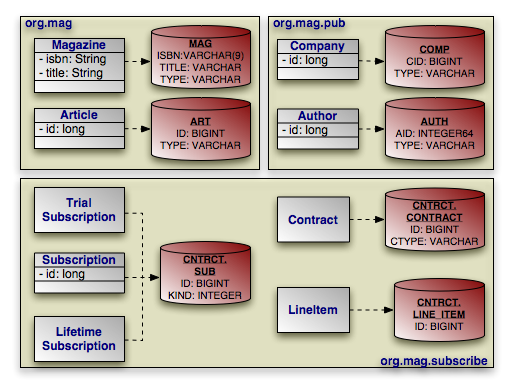7. Discriminator
The single table inheritance strategy results in a single table containing records for two or more different classes in an inheritance hierarchy. Similarly, using the joined strategy results in the superclass table holding records for superclass instances as well as for the superclass state of subclass instances. When selecting data, JPA needs a way to differentiate a row representing an object of one class from a row representing an object of another. That is the job of the discriminator column.
The discriminator column is always in the table of the base entity. It holds a different value for records of each class, allowing the JPA runtime to determine what class of object each row represents.
The DiscriminatorColumn annotation represents a
discriminator column. It has these properties:
-
String name: The column name. Defaults toDTYPE. -
length: For string discriminator values, the length of the column. Defaults to 31. -
String columnDefinition: This property has the same meaning as thecolumnDefinitionproperty on theColumnannotation, described in Section 3, “ Column ”. -
DiscriminatorType discriminatorType: Enum value declaring the discriminator strategy of the hierarchy.
The corresponding XML element is discriminator-column. Its
attributes mirror the annotation properties above:
-
name -
length -
column-definition -
discriminator-type: One ofSTRING,CHAR, orINTEGER.
The DiscriminatorValue annotation specifies the
discriminator value for each class. Though this annotation's value is always a
string, the implementation will parse it according to the
DiscriminatorColumn's discriminatorType property
above. The type defaults to DiscriminatorType.STRING, but
may be DiscriminatorType.CHAR or
DiscriminatorType.INTEGER. If you do not specify a
DiscriminatorValue, the provider will choose an appropriate
default.
The corresponding XML element is discriminator-value. The
text within this element is parsed as the discriminator value.
Note
OpenJPA assumes your model employs a discriminator column if any of the following are true:
-
The base entity explicitly declares an inheritance type of
SINGLE_TABLE. -
The base entity sets a discriminator value.
-
The base entity declares a discriminator column.
Only SINGLE_TABLE inheritance hierarchies require a
discriminator column and values. JOINED hierarchies can use
a discriminator to make some operations more efficient, but do not require one.
TABLE_PER_CLASS hierarchies have no use for a discriminator.
OpenJPA defines additional discriminator strategies; see Section 7, “ Additional JPA Mappings ” in the Reference Guide for details. OpenJPA also supports final entity classes. OpenJPA does not use a discriminator on final classes.
We can now translate our newfound knowledge of JPA discriminators into concrete JPA mappings. We first extend our diagram with discriminator columns:
 |
Next, we present the updated mapping document. Notice that in this version, we
have removed explicit inheritance annotations when the defaults sufficed. Also,
notice that entities using the default DTYPE discriminator
column mapping do not need an explicit DiscriminatorColumn
annotation.
Example 13.9. Discriminator Mapping
package org.mag;
@Entity
@IdClass(Magazine.MagazineId.class)
@Table(name="MAG")
@DiscriminatorValue("Mag")
public class Magazine {
@Column(length=9)
@Id private String isbn;
@Id private String title;
...
public static class MagazineId {
...
}
}
@Entity
@Table(name="ART", uniqueConstraints=@Unique(columnNames="TITLE"))
@SequenceGenerator(name="ArticleSeq", sequenceName="ART_SEQ")
public class Article {
@Id
@GeneratedValue(strategy=GenerationType.SEQUENCE, generator="ArticleSeq")
private long id;
...
}
package org.mag.pub;
@Entity
@Table(name="COMP")
public class Company {
@Column(name="CID")
@Id private long id;
...
}
@Entity
@Table(name="AUTH")
public class Author {
@Id
@GeneratedValue(strategy=GenerationType.TABLE, generator="AuthorGen")
@TableGenerator(name="AuthorGen", table="AUTH_GEN", pkColumnName="PK",
valueColumnName="AID")
@Column(name="AID", columnDefinition="INTEGER64")
private long id;
...
}
@Embeddable
public class Address {
...
}
package org.mag.subscribe;
@MappedSuperclass
public abstract class Document {
@Id
@GeneratedValue(strategy=GenerationType.IDENTITY)
private long id;
...
}
@Entity
@Table(schema="CNTRCT")
@Inheritance(strategy=InheritanceType.JOINED)
@DiscriminatorColumn(name="CTYPE")
public class Contract
extends Document {
...
}
@Entity
@Table(name="SUB", schema="CNTRCT")
@DiscriminatorColumn(name="KIND", discriminatorType=DiscriminatorType.INTEGER)
@DiscriminatorValue("1")
public class Subscription {
@Id
@GeneratedValue(strategy=GenerationType.IDENTITY)
private long id;
...
@Entity
@Table(name="LINE_ITEM", schema="CNTRCT")
public static class LineItem
extends Contract {
...
}
}
@Entity(name="Lifetime")
@DiscriminatorValue("2")
public class LifetimeSubscription
extends Subscription {
...
}
@Entity(name="Trial")
@DiscriminatorValue("3")
public class TrialSubscription
extends Subscription {
...
}
The same metadata expressed in XML:
<entity-mappings xmlns="http://java.sun.com/xml/ns/persistence/orm"
xmlns:xsi="http://www.w3.org/2001/XMLSchema-instance"
xsi:schemaLocation="http://java.sun.com/xml/ns/persistence/orm orm_1_0.xsd"
version="1.0">
<mapped-superclass class="org.mag.subscribe.Document">
<attributes>
<id name="id">
<generated-value strategy="IDENTITY"/>
</id>
...
</attributes>
</mapped-superclass>
<entity class="org.mag.Magazine">
<table name="MAG"/>
<id-class="org.mag.Magazine.MagazineId"/>
<discriminator-value>Mag</discriminator-value>
<attributes>
<id name="isbn">
<column length="9"/>
</id>
<id name="title"/>
...
</attributes>
</entity>
<entity class="org.mag.Article">
<table name="ART">
<unique-constraint>
<column-name>TITLE</column-name>
</unique-constraint>
</table>
<sequence-generator name="ArticleSeq" sequence-name="ART_SEQ"/>
<attributes>
<id name="id">
<generated-value strategy="SEQUENCE" generator="ArticleSeq"/>
</id>
...
</attributes>
</entity>
<entity class="org.mag.pub.Company">
<table name="COMP"/>
<attributes>
<id name="id">
<column name="CID"/>
</id>
...
</attributes>
</entity>
<entity class="org.mag.pub.Author">
<table name="AUTH"/>
<attributes>
<id name="id">
<column name="AID" column-definition="INTEGER64"/>
<generated-value strategy="TABLE" generator="AuthorGen"/>
<table-generator name="AuthorGen" table="AUTH_GEN"
pk-column-name="PK" value-column-name="AID"/>
</id>
...
</attributes>
</entity>
<entity class="org.mag.subcribe.Contract">
<table schema="CNTRCT"/>
<inheritance strategy="JOINED"/>
<discriminator-column name="CTYPE"/>
<attributes>
...
</attributes>
</entity>
<entity class="org.mag.subcribe.Subscription">
<table name="SUB" schema="CNTRCT"/>
<inheritance strategy="SINGLE_TABLE"/>
<discriminator-value>1</discriminator-value>
<discriminator-column name="KIND" discriminator-type="INTEGER"/>
<attributes>
<id name="id">
<generated-value strategy="IDENTITY"/>
</id>
...
</attributes>
</entity>
<entity class="org.mag.subscribe.Subscription.LineItem">
<table name="LINE_ITEM" schema="CNTRCT"/>
<primary-key-join-column name="ID" referenced-column-name="PK"/>
...
</entity>
<entity class="org.mag.subscribe.LifetimeSubscription" name="Lifetime">
<discriminator-value>2</discriminator-value>
...
</entity>
<entity class="org.mag.subscribe.TrialSubscription" name="Trial">
<discriminator-value>3</discriminator-value>
...
</entity>
</entity-mappings>